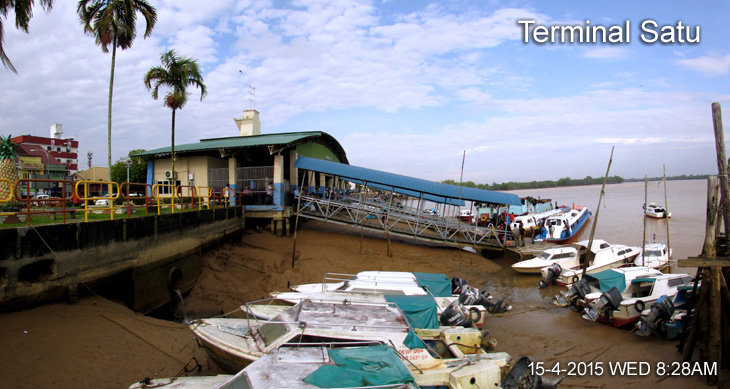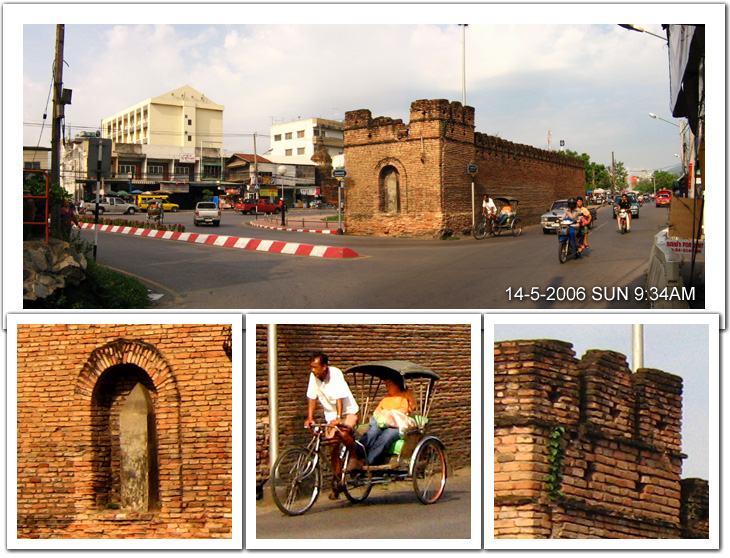
KUDAT
Places of interest in Kudat
SABAH > Kudat Division > Kudat Town

KUDAT
Places of interest in Kudat
Attraction around Kudat:
Gombizau Honey Bee Farm
Kampung Bavanggazo (Rungus Longhouse)
Kampung Sumangkap Gong Factory
Kelambu Beach
Kudat Golf Club
Maranjak Longhouse Homestay
Tamu Kudat
The Tip of Borneo - Tanjung Simpang Mengayau
Kudat - a small town in the north of Sabah. About 3 hours from Kota Kinabalu
by car.
Population is only 26,750 (year 2000 census), comprising mainly of Rungus (rural
areas); Bruneis and Chinese (town area) and ethnic entities Obian/Ubian, Suluk,
Bajau, Irranun/Illanun.

Fuk Tek Kung Chinese Temple
A Chinese temple in Kudat town.
Kudat's population was 70,000 in 2000. The ethnic composition is mainly Rungus,
( sub-group of Kadazan).
About 10% are ethnic Chinese, and there are minorities of Bajau, Dusun, Murut,
Bugis, and Malay. There is also a considerable number of unregistered illegal
immigrants from the nearby Philippines Sulu regions and Mindanao.
Kudat town was founded by A H Everett of the British North Borneo Company on
December 7, 1881 as the first capital of British North Borneo, due to its
strategic geographic location.
After being repeatedly raided by Bajau, Sulu and Illanun pirates, the capital
was shifted in 1883 to Sandakan, on the east coast.
The first group of Chinese pioneers arrived in 1883, followed by a steady flow
of Hakkas who cleared the jungles to establish coconut plantations and small
farms.
These Hakka Chinese built their own homes, churches and schools.
Early 20th century, they began planting rubber.
Other Chinese dialect groups eventually made Kudat their home, but the district
remains dominated by the Christian Hakka of the Basel Church.

Ferry to Pulau Banggi
An air-conditioned daily ferry leaves Kudat at 9 am for Kerakit. Pulau Banggi.
Alternatively, a local boat can be hired in Kudat for voyages of exploration or
fishing trips around Banggi and Balambangan.
Kudat district has some of the finest beaches in Sabah. offering safe swimming,
picnicking and fishing as well as peace and tranquility. Most beaches are also
suitable for camping (but bring fresh water). Many visitors are astonished the
sight of pristine beaches and bays, where only on Sundays (and only on the most
popular beaches) is there likely to be a mere handful of holiday makers.
The best beaches are found along the west coast, starting south at Indarasan
Laut, which is reached via Tinangol. The deeply indented bay of Teluk Agal (also
known as Tambularan Bay). beyond Kg Bingolan, has two sizeable rivers at either
end of a sweeping beach, and a small village which offers a haven for local
fishing boats.
Reached via Kampung Minyak. the long beach of Terongkongan is known for a narrow
cave. Gua Tindakop, carved into the rocky headland to the north. Pantai Kimihang,
accessible by Jalan Bangau, is shallow but a good spot for picnicking and
camping, with shady trees. A deep river provides a pleasant place for swimming,
especially if it happens to be low tide. Local fishermen frequently try their
luck with nets as the tide comes in.
Perhaps the most popular beach in the region is Pantai Kelambu, where a sand
spit leading to a small rocky island creates large bays on either side; whatever
the direction of the wind, there's always a calm area for swimming. The picnic
area is usually busy on Sundays, but a short walk along the beach of either bay
promises privacy.
Nestling in the hills on Jalan Marang Parang, shortly before Pantai Kolambu, the
attractive Sunjamal Resort offers a peaceful retreat in spacious, Rungus-inspired
chalets. A range of activities,

Kudat Town
Kudat is a small town that has kept some of its rural charm, and one sees still
elderly Rungus folks in traditional attire.
The restaurants and coffee shops offer good foods, and seafood is inexpensive.
One will have seen the whole town in a few minutes. Walk from the Chinese temple
to the newly built waterfront in fifteen minutes, passing by the market.
There are a few budget hotels that are clean and reasonably priced, and of
course there is the newly opened Kudat Golf and Marina Resort, the flagship of
Kudatís developing tourism industry.
Kudat is quiet and devoid of the hectic town life. This town remains a
destination few will visit, despite its upgraded infrastructure that brought
better accessibility and accommodation.
Some day tours that are a must if you stay longer:
1) the Bak-Bak Beach, where you can mingle with the locals;
2) Tanjung Sempang Mengayau, the very Tip of Borneo with its dramatic landscape
and white beaches Northern Tip of Borneo - 7 degrees north of equator
3) the islands Balambangan and Banggi. There are daily ferries to the islands.
The surroundings of Kudat are made for walks, and cycling. You can discover
secluded beaches, and remote villages where people live an age-old traditional,
and quiet life.

Tip of Borneo
(Simpang Mengayau)
Northernmost tip of Borneo, the Simpang Mengayau, is only 40 kilometers from
Kudat is a truly fascinating area to visit and
Simpang Mengayau has remained relatively undisturbed and was only recently
"discovered" as a tourism destination. Pristine beaches, indigenous longhouses,
secluded diving, intricate handicraft by the Rungus people - the ethnic entity
that populates the Kudat Peninsula.
Over the last few years the peninsula has seen tremendous upgrading of
infrastructure, and this very tip of Borneo Island is now accessible by car in
little under three hours from Kota Kinabalu City.
A visit to Sabah should not be complete without having seen the very Tip of
Borneo at least...!
Shortly after the British North Borneo Chartered Company leased the territory of
Sabah from the sultans of Brunei and Sulu, they establish shed a settlement at
Kudat and declared it their first capital in ISS2. Just two years later,
however, water shortages forced the administration to move their capital east to
Sandakan.
The Rungus the indigeous tribe on the Kudat peninsula and on the east side of
Marudu Bay made their homes inland, while the coastline attracted Muslim Bajau,
Irranun and Suluk. The Rungus called the Kudat area after the Tomborungus River
that ran into an inlet nearby. When the British arrived and asked for the name
of the place, the Rungus thought they wanted to identify the coarse grass
growing there, so said Kutad. Eventually, the name was corrupted to Kudat, and
was used in preference to the old name of Tomborungus. Because of a labor
shortage, the British North Borneo Chartered Company engaged the Basel
Missionary Society to bring in families of Christian Hakkas from southern China
to help develop Kudat.
Accessible primarily by sea until less than 50 years ago, when a road eventually
linked Kudat with Kota Kinabalu, Kudat's past isolation has ensured that much of
the original charm and tradition of the region remain relatively unchanged.
Getting to Kudat
By car, van, bus or taxi; tour operator; 180 km / 3 to 4 hours;
On you journey, stop by at the many markets, visit the 'one village one trade'
kampungs of Gombizau (honey), Sumangkap (gongs), Tinanggol (beads) and
Bavanggazo (longhouse living culture). Meet the locals and chat with them;
stroll through the fish markets of Kudat where some of Sabah's best seafood
comes from. And enjoy a sumptuous meal, be it for lunch or dinner, of the best
the seas can offer at unbeatable prices. Relax on some of the most beautiful
beaches you'll ever see, and if you are a diver you will find the area not only
intriguing for its marine life, but also for the treasure trove of ancient
wrecks that can be found in the north of Sabah. Who knows, you might even make
an important discovery...!
For the traveler there is now a wide choice of accommodation, ranging from
homestay programmes in villages where you can taste longhouse living over simple
town hotels to the newly completed Kudat Marina & Golf Resort.

Pulau Banggi and Pulau Balalmbangan
en.wikipedia.org/wiki/Balambangan
Pulau Banggi, with its dramatic high mountain peak, and the sprawling flat
island of Pulau Balalmbangan both lie to the north of Kudat. Kerakit, the major
settlement in the south of Pulau Banggi, offers very simple facilities but no
tourism infrastructure at this stage. Just south of Kerakit, the island of
Malleangan- where a fine white sandy beach is backed with coconut palms with a
few houses dotted about-is the sort of place which tempts the adventurous to
camp and live the simple life for a few days.
Pulau Balambangan, the site of an abortive British settlement in the 18th
century, has a small settlement at Kampung Batu Sireh, in the southeast. This is
not far from a cave set in a limestone outcrop at one side of an exquisite tiny
bay, an important archaeological site where evidence of human habitation some
16,000 years ago was uncovered.
Pulau Balambangan (Balambangan Island) is north of Kudat, and closest to
Philippines. This island has 20 over limestone caves mostly unexplored and
undocumented.
North of Kampung Batu Sirih, at one side of a large and beautiful bay, Teluk
Lung, lie the remnants of the abortive Balambangan settlement, shards of Chinese
porcelain, tiles and bottles fused by the fires after an attack by pirates. The
clear waters of this bay are appealing not only for swimming but are home to a
seaweed research project
HOW TO GET TO KUDAT AND KOTA BELUD
Mini-buses for Kota Belud leave from the bus station in front of
Centrepoint Complex, in Kota Kinabalu, throughout the day; the fare is RM10.
Air-conditioned buses for Kudat and Kota Marudu, leaving from near the Padang at
7.30 am, 6.30 am, 12 noon and 1 pm, can be taken as far as Kota Belud (RM10), or
on as far as Kudat for the same fare. In Kudat, buses for Kota Kinabalu leave
from next to the Telekoms office, opposite the clothing market near Hotel
Sunrise.
It is possible to share a long-distance taxi (RM 25 per person) or to charter it
for RM100, between Kota Kinabalu and Kudat; long-distance taxis leave from near
KK Padang.
Car hire companies offer self-drive sedans or 4-wheel drive vehicles for
journeys to Kudat; sedans cost around RM1S0 per day, while a 4-wheel drive costs
from RM250-300.
RELATED TOPICS

Kota Samarahan
Sarawak, Malaysia
Know as Muara Tuang before 1980s. At that time was a small trading village. The
village was linked to Kuching via road only in early 1970s. Before that, the
only means of transport to the village was via the river. Development of the
small village accelerated with the construction of a 25-km road link to Kuching.

SARIKEI TOWN 泗裡街
Sarawak, Malaysia

Chiang Mai
Thailand
A land of warm hospitality. A land of mist-shrouded mountains and fertile
valleys.
|
|
SABAH |